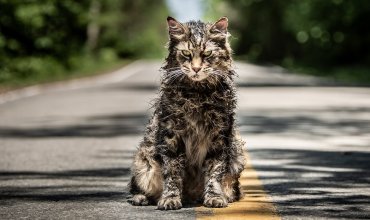Q: What the hell happened in the 1970s?
A: Stephan Elliot’s childhood.
This is the guide rope you need to hold onto in order to get through Elliott’s new feature film SWINGING SAFARI. By definition, any screenwriter or film director’s take on the era in which they were a child and a teenager must be their point-of-view. As Elliott says (in the AccessReel interview) he made a very personal film.
The point is worth emphasising, because this reviewer also has memories of a 1970s childhood and yet I found the experience of watching this film was like stumbling into a sci-fi parallel universe that superficially resembled my childhood, but after some minutes spent there, felt like it had barely any connection to the world I grew up in.
Firstly, there’s the sheer speed of the storytelling. Elliott subjected himself and his crew to a punishing shooting schedule in order to cover approximately 300 scenes. As he points out, that’s about twice as many scenes as your average 90-minute movie will attempt. The end result is a flurry of images and sequences. Hardly any moment is given time to breathe, nor is the audience certain about the location of the characters or indeed the names of those characters or whichever family they are supposed to be part of.
The film is about three families that live in a cul-de-sac in a fictional beach-side Sydney suburb named Nobby’s Beach; Radha Mitchell and Julian McMahon are the upmarket Jones family, Kylie Minogue and Guy Pearce are the the Halls and Jeremy Sims and Asher Keddie are the Marshes. It is their son Jeff (Atticus Robb) who is the boy observing everything and telling us about it years later in the form of an adult voiceover (Richard Roxburgh).
Jeff is Elliott’s stand in. He is fourteen and wants to be a filmmaker. This makes him something of a nerd to some of the kids, although others are impressed with the stunts he creates with his select group of “Death Cheaters”. They shoot their bike and pool stunts on a super-8 film camera. Jeff and one of the Jones kids, Melly (Darcey Wilson) are sort of boyfriend and girlfriend. Apparently Melly is a version of Elliott’s friend from the time and the film’s actual costume designer (Oscar, BAFTA and Tony award-winning) Lizzy Gardiner.
And thus, all the outfits in this movie are great. At the level of hair, make-up, wardrobe and art direction, we are very nicely brought back to a gaudy, flashy approximation of the era. Bankcard sticker in a shop window? Check! Polydor label on the disc spinning on the turntable? Check! The attention to the accurate use of the slang of the time is somewhat weaker; the 1970s love of smoking cigarettes is underdone.
The film is also about the carcass of a 200-ton beached whale. There is also a “key-party” that the three couples throw in an attempt to “swing”. The consequences of both events are supposed to be far-reaching.
The point Elliott wants us to understand about his 1970s is that parents were clueless hedonists who ignored the needs, interests and lives of their children. There is some truth to this. The much maligned “helicopter” parents are a direct reaction to my parents’ generation who really were, just as many an Internet forum or meme will tell you, okay if we rode off on our “Stranger Things” chopper bikes in the mornings and didn’t return home until evening. However, Elliot’s take on this style of parenting is cranked-up to 11. Possibly this is done for the sake of comedy, but when it comes to the scenes which include children being burnt by wearing flammable clothing, I have no idea what reaction Elliott is seeking. Is this deplorable, hilarious, something else? What is being said here?
Similarly, the attitude towards animals leads to questions rather than giving answers. A number of characters indulge in casual animal cruelty and end up looking a bit of a psycho. Again, what is being said here?
Elliott might not see these decisions as vague, but I would argue he needed to take a step back and maybe give his adult narrator some answers (a-la the Dreyfuss character in STAND BY ME). Sure, life is mixed up and confusing, but as the ludicrous, blubbery “Zabriske Point” ending comes showering down on the denizens of Nobby’s Beach, rather than seeming like a fun celebration of the zany 1970s, it comes off as an over-the-top, cynical critique of that time and those parents.
SWINGING SAFARI is a densely-packed, fast-moving, bewildering, crass, unfunny, brightly-coloured and loud version of a 1970s childhood. Its energy and talented cast make it marginally watchable, but its undisciplined storytelling means it’s an opportunity missed. 96 minutes.(4/10)
LISTEN TO: Darran’s recent interview with Stephan Elliott


